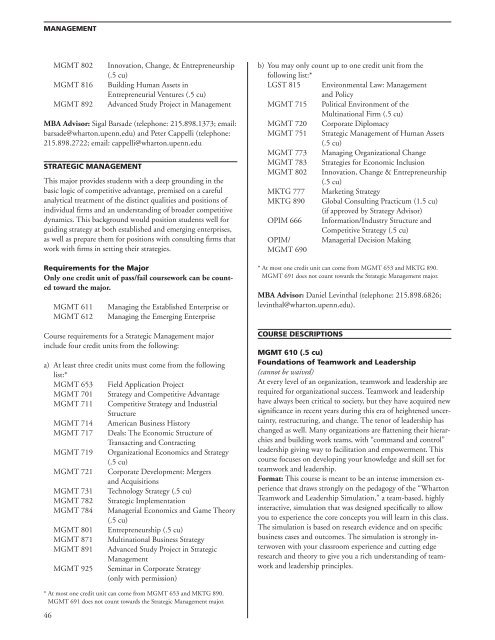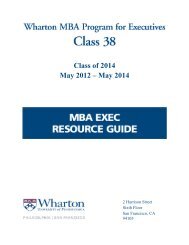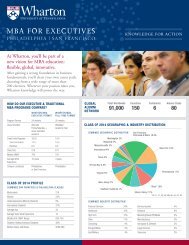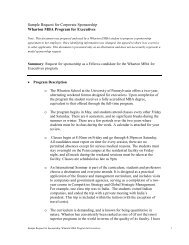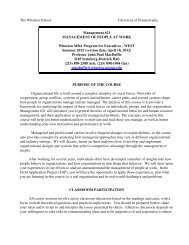Explore Options; Plan Your MBA Academic Program
Explore Options; Plan Your MBA Academic Program
Explore Options; Plan Your MBA Academic Program
You also want an ePaper? Increase the reach of your titles
YUMPU automatically turns print PDFs into web optimized ePapers that Google loves.
MANAGEMENT<br />
46<br />
MGMT 802 Innovation, Change, & Entrepreneurship<br />
(.5 cu)<br />
MGMT 816 Building Human Assets in<br />
Entrepreneurial Ventures (.5 cu)<br />
MGMT 892 Advanced Study Project in Management<br />
<strong>MBA</strong> Advisor: Sigal Barsade (telephone: 215.898.1373; email:<br />
barsade@wharton.upenn.edu) and Peter Cappelli (telephone:<br />
215.898.2722; email: cappelli@wharton.upenn.edu<br />
STRATEGIC MANAGEMENT<br />
This major provides students with a deep grounding in the<br />
basic logic of competitive advantage, premised on a careful<br />
analytical treatment of the distinct qualities and positions of<br />
individual firms and an understanding of broader competitive<br />
dynamics. This background would position students well for<br />
guiding strategy at both established and emerging enterprises,<br />
as well as prepare them for positions with consulting firms that<br />
work with firms in setting their strategies.<br />
Requirements for the Major<br />
Only one credit unit of pass/fail coursework can be counted<br />
toward the major.<br />
MGMT 611 Managing the Established Enterprise or<br />
MGMT 612 Managing the Emerging Enterprise<br />
Course requirements for a Strategic Management major<br />
include four credit units from the following:<br />
a) At least three credit units must come from the following<br />
list:*<br />
MGMT 653 Field Application Project<br />
MGMT 701 Strategy and Competitive Advantage<br />
MGMT 711 Competitive Strategy and Industrial<br />
Structure<br />
MGMT 714 American Business History<br />
MGMT 717 Deals: The Economic Structure of<br />
Transacting and Contracting<br />
MGMT 719 Organizational Economics and Strategy<br />
(.5 cu)<br />
MGMT 721 Corporate Development: Mergers<br />
and Acquisitions<br />
MGMT 731 Technology Strategy (.5 cu)<br />
MGMT 782 Strategic Implementation<br />
MGMT 784 Managerial Economics and Game Theory<br />
(.5 cu)<br />
MGMT 801 Entrepreneurship (.5 cu)<br />
MGMT 871 Multinational Business Strategy<br />
MGMT 891 Advanced Study Project in Strategic<br />
Management<br />
MGMT 925 Seminar in Corporate Strategy<br />
(only with permission)<br />
* At most one credit unit can come from MGMT 653 and MKTG 890.<br />
MGMT 691 does not count towards the Strategic Management major.<br />
b) You may only count up to one credit unit from the<br />
following list:*<br />
LGST 815 Environmental Law: Management<br />
and Policy<br />
MGMT 715 Political Environment of the<br />
Multinational Firm (.5 cu)<br />
MGMT 720 Corporate Diplomacy<br />
MGMT 751 Strategic Management of Human Assets<br />
(.5 cu)<br />
MGMT 773 Managing Organizational Change<br />
MGMT 783 Strategies for Economic Inclusion<br />
MGMT 802 Innovation, Change & Entrepreneurship<br />
(.5 cu)<br />
MKTG 777 Marketing Strategy<br />
MKTG 890 Global Consulting Practicum (1.5 cu)<br />
(if approved by Strategy Advisor)<br />
OPIM 666 Information/Industry Structure and<br />
Competitive Strategy (.5 cu)<br />
OPIM/ Managerial Decision Making<br />
MGMT 690<br />
* At most one credit unit can come from MGMT 653 and MKTG 890.<br />
MGMT 691 does not count towards the Strategic Management major.<br />
<strong>MBA</strong> Advisor: Daniel Levinthal (telephone: 215.898.6826;<br />
levinthal@wharton.upenn.edu).<br />
COURSE DESCRIPTIONS<br />
MGMT 610 (.5 cu)<br />
Foundations of Teamwork and Leadership<br />
(cannot be waived)<br />
At every level of an organization, teamwork and leadership are<br />
required for organizational success. Teamwork and leadership<br />
have always been critical to society, but they have acquired new<br />
significance in recent years during this era of heightened uncertainty,<br />
restructuring, and change. The tenor of leadership has<br />
changed as well. Many organizations are flattening their hierarchies<br />
and building work teams, with “command and control”<br />
leadership giving way to facilitation and empowerment. This<br />
course focuses on developing your knowledge and skill set for<br />
teamwork and leadership.<br />
Format: This course is meant to be an intense immersion experience<br />
that draws strongly on the pedagogy of the “Wharton<br />
Teamwork and Leadership Simulation,” a team-based, highly<br />
interactive, simulation that was designed specifically to allow<br />
you to experience the core concepts you will learn in this class.<br />
The simulation is based on research evidence and on specific<br />
business cases and outcomes. The simulation is strongly interwoven<br />
with your classroom experience and cutting edge<br />
research and theory to give you a rich understanding of teamwork<br />
and leadership principles.


